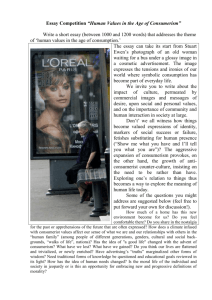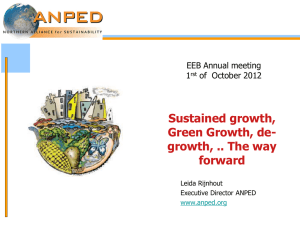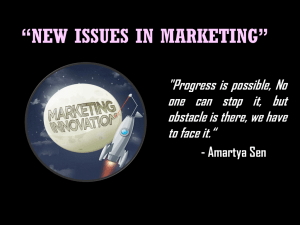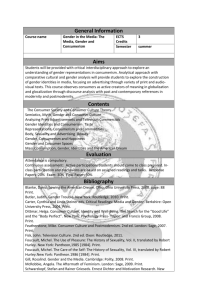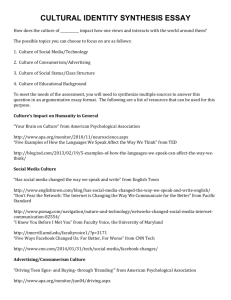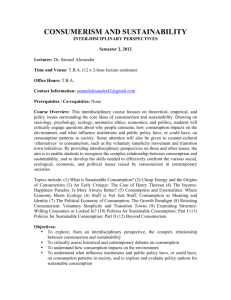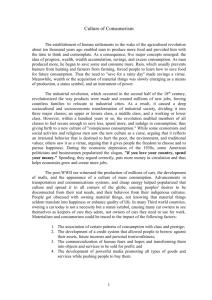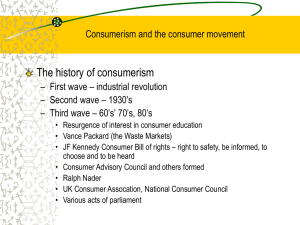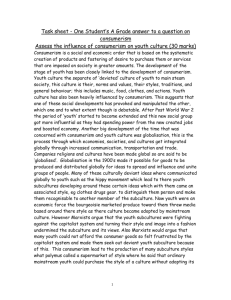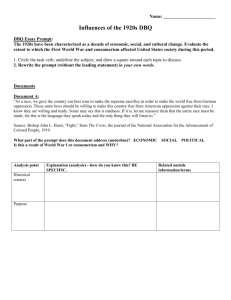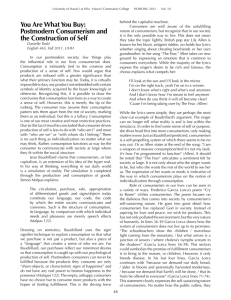An Essay on Consumerism by Zach Frentress
advertisement
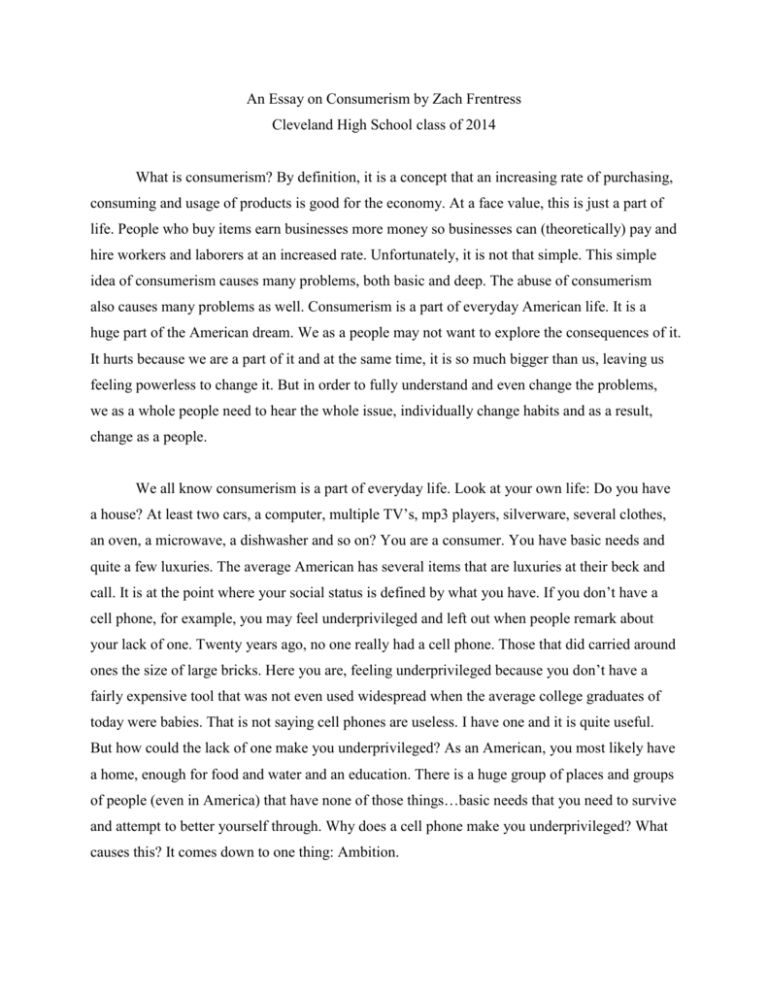
An Essay on Consumerism by Zach Frentress Cleveland High School class of 2014 What is consumerism? By definition, it is a concept that an increasing rate of purchasing, consuming and usage of products is good for the economy. At a face value, this is just a part of life. People who buy items earn businesses more money so businesses can (theoretically) pay and hire workers and laborers at an increased rate. Unfortunately, it is not that simple. This simple idea of consumerism causes many problems, both basic and deep. The abuse of consumerism also causes many problems as well. Consumerism is a part of everyday American life. It is a huge part of the American dream. We as a people may not want to explore the consequences of it. It hurts because we are a part of it and at the same time, it is so much bigger than us, leaving us feeling powerless to change it. But in order to fully understand and even change the problems, we as a whole people need to hear the whole issue, individually change habits and as a result, change as a people. We all know consumerism is a part of everyday life. Look at your own life: Do you have a house? At least two cars, a computer, multiple TV’s, mp3 players, silverware, several clothes, an oven, a microwave, a dishwasher and so on? You are a consumer. You have basic needs and quite a few luxuries. The average American has several items that are luxuries at their beck and call. It is at the point where your social status is defined by what you have. If you don’t have a cell phone, for example, you may feel underprivileged and left out when people remark about your lack of one. Twenty years ago, no one really had a cell phone. Those that did carried around ones the size of large bricks. Here you are, feeling underprivileged because you don’t have a fairly expensive tool that was not even used widespread when the average college graduates of today were babies. That is not saying cell phones are useless. I have one and it is quite useful. But how could the lack of one make you underprivileged? As an American, you most likely have a home, enough for food and water and an education. There is a huge group of places and groups of people (even in America) that have none of those things…basic needs that you need to survive and attempt to better yourself through. Why does a cell phone make you underprivileged? What causes this? It comes down to one thing: Ambition. What is ambition? I personally liken it to sex: it is a fundamental human drive that we all have that can be beautiful if used in a wise and careful way and yet can be terribly destructive if used wrong. We all have it. It is something that is never satisfied. It can be quenched for a time, but never given up without denying yourself first. No great conqueror sat in his tent one night and said “You know what? I have conquered quite a bit. I think I am just gonna stop. I don’t want another rich kingdom or country under my control.” That is because it is engrained in you. Once you have something, you want more. It is part of human nature. You can’t give power up without denying your very nature either. It is like kissing: once you do it, you can’t just go back to hand-holding again. You are leading up to something…and you don’t want to go back. You are chasing something. You are working up to something. Since you are, as a fellow human being, ambitious, and trying to attain something and you always want a bit more, what does that entail? What if you are living your life, trying to work for something and you see someone who already has it? You want it. You feel underprivileged. You want to be that person. Don’t you see that ambitious drive at work? And what entails from this jealousy? Power struggles, hate, wars and an ever-increasing conflict between the fortunate and less fortunate. The results are all around negative and result in a lot of pain for everyone involved. What about those left behind in this battle of ambition? No one (or not enough) people help to pull them out of their deep hole of necessities they lack that keep them up with the rest of the world. They get so far behind that they can no longer keep basic needs both short and long term. How does this translate to consumerism? It is simple. We as humans define our success in life by what we have. That is a very broad concept. We can define a successful life by the morals, exhilarating or joyful feelings or friends we have. Usually though, you define success by material possessions. A rich man with a mansion and Ferrari is pretty much more successful by most worldly standards than a homeless man without a penny to his name. This is not a modern concept, either. In ancient biblical times, your wealth was defined by the color of your clothes (how expensive the dye on it is, I should say) and the number of livestock you have. It is a part of human nature. We define our success by what we have because it is quantitative, measurable and has immediate payoff. So as we get more and more things (as advertising in a media- saturated world urges) and we get more and more, we (sometimes subconsciously) enter a contest. You see people with nice things that you don’t have but can somehow get these things relatively easily. You get them. You like the temporary gratification. It wears off and you chase more and more. You feel entitled to things like computers, iPods and cell phones because all Americans do. You gain more and more because you, as an American, are “entitled.” What is so bad about this? What is the problem of buying things? The two main problems are social repercussions and environmental repercussions. There are a huge number of social ramifications for people and societies wrapped up in consumerism. I could write a whole separate paper on social repercussions of consumerism. I will do my best to keep it relatively short. First off has to do with time. This applies to specific individuals who are purchasing goods at a large rate. How do you keep up with the money you blow? You work more. In order to upkeep their lifestyle, many people increase their job hours, take two jobs, have both couples work jobs and so on. That decreases time for many things such as family, sleep and just some good old free time. Stress builds up in people. According to depressionperception.com, 75% of Americans report some stress in a two week period. Half of them reported their stress to be moderate to serious. Stress increases the danger of heart disease, high blood pressure, strokes, depression and so on. School children are under attack as well. In a more connected and competitive world, more and more children are under pressure at young ages to get good grades and test scores to get into better colleges and jobs to in turn get more money. Stress in students is increasing. I have personal experience with overwhelming school work leading to a stress-related disease. Other problems have to do with a sort-of class system. Poorer countries are often victimized by richer countries. The Congo was subject to exploitation by Belgium rule and still has not recovered from the occupation. This has consumerism written all over it: A whole people were exploited with slave labor for material profit. Upon independence, civil war and slavery continued because of a lack of education, leadership and greed not leaving. It is important to note that the Congo is one of if not the richest country in Africa in terms of mineral and natural reserves. And yet, because of ambition, consumerism and greed, it is one of the poorest nations in all of Africa. Another thing you must ask is where does your trash go? What happens to the 4.5 pounds daily used up by the average American (according to http://www.learner.org/interactives/garbage/intro.html)? Most goes to a landfill to sit and take up space for all eternity. Oftentimes, toxins leak into the soil and rivers from these landfills. Often, large quantities of items in landfills are recyclable. What about making all these material goods? Look at cell phones: plastic (made of oil or synthetic material), copper wires, col-tan (a radioactive material often illegally smuggled out of primarily the Congo by forced labor…often causing tumors in the workers) and so on. That is a lot of synthesizing and mining going into that. Those things are toxic to the environment. Using items like a cars release toxic carbon too. The country of America alone released 20 tons of carbon a year (www.eoearth.org/article/Carbon_footprint ) on average and is consuming more materials than the earth can in the long run sustain. Our consumerism lifestyle is one the earth just cannot support. So now what? If there is a problem that is rooted in my nature with far-reaching consequences (which are hard to see, it should be noted), what can I do? Is there some sort of five step clean cut plan that I can lay out to eliminate the problem? Unfortunately, no. The problem of over-consumerism is going to be impossible to solve, in fact, unless something fundamentally changes in humans to recognize what they are doing. It starts with you. You need to think about your daily habits. You need to be aware of all that is around you. You then need to thoughtfully find ways to control your consumerism habits. Only you know what motivates you. Only you can change your habits. Everyone has a contribution to make. It is also ridiculous to think we can stop the problem cold turkey. It is a gradual process of individuals slowly changing so that it is not too much to bear. When people change, society as a whole changes. Then, people as a whole will begin to rid themselves of problems and hurts that have plagued mankind since its dawn of creation. Once we conquer ourselves, what is to hold us back?
